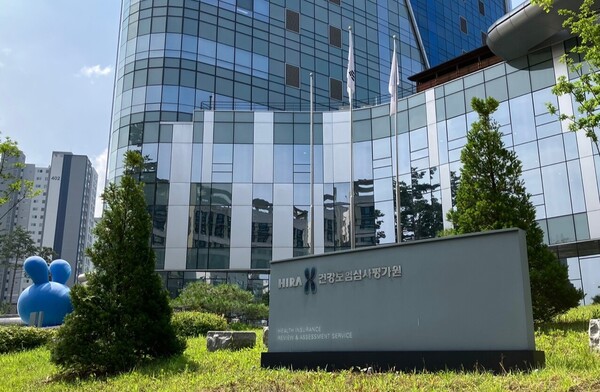Esophageal squamous cell carcinoma treatment Tevimbra (tislelizumab), pulmonary fibrosis treatment Ofev (nintedanib), and cholangiocarcinoma treatment Pemazyre (pemigatinib) passed this year’s first Pharmaceutical Reimbursement Review Committee (PREC) meeting, moving a step closer to health insurance coverage.
The non-small cell lung cancer (NSCLC) drug Lorviqua (lorlatinib), which had failed to expand its benefits due to a failed drug price negotiation, was tried again. Still, it is unlikely to pass unless it lowers the drug price, as it must accept below the appraised value to get benefits.

The Health Insurance Review and Assessment Service (HIRA) held its first Pharmaceutical Reimbursement Assessment Committee this year on Thursday to deliberate on the appropriateness of reimbursement for drugs, including Tevimbra, and those wanting to expand their existing reimbursement, including Lorviqua.
As a result, BeiGene Korea's anti-PD-1 immuno-oncology drug Tevimbra and Handok's FGFR inhibitor Pemazyre were recognized as appropriate for receiving benefits.
Tevimbra is a treatment for esophageal squamous cell carcinoma indicated as monotherapy in adult patients with unresectable, recurrent, locally advanced, or metastatic esophageal squamous cell carcinoma who cannot continue prior platinum-based chemotherapy or who have relapsed or progressed after receiving prior therapy.
After receiving approval from the Ministry of Food and Drug Safety in November 2023, the drug passed the Cancer Disease Review Committee (CDRC) on its second attempt but cleared the threshold of the Pharmaceutical Reimbursement Evaluation Committee on its first attempt.
Pemazyre won the MFDS approval in April 2023 for “locally advanced or metastatic cholangiocarcinoma with fibroblast growth factor receptor 2 (FGFR2) fusion or rearrangement in adults who have received at least one prior systemic therapy. It also succeeded in establishing benefit criteria after a second attempt at CDRC but passed the PREC on its first try.
Ofev, a treatment for the incurable and rare disease pulmonary fibrosis passed the PREC, raising its chances of getting off the non-reimbursement list. It has been nine years since the drug was approved by the MFDS in 2016 to treat idiopathic pulmonary fibrosis (IPF).
Following its 2016 approval for idiopathic pulmonary fibrosis, Ofev has expanded its indications to “delaying decline in lung function in patients with systemic sclerosis-associated interstitial lung disease” and “treating chronic fibrotic interstitial lung disease with a progressive phenotype.” The drug has repeatedly failed to receive reimbursement due to its high cost and comparability with pirfenidone.
This time, however, its reimbursement was approved only for pre-neurotic interstitial lung disease and advanced pulmonary fibrosis, excluding idiopathic pulmonary fibrosis.
Lorviqua, which had failed to gain reimbursement due to a failed drug price negotiation, has added five-year progression-free survival (PFS) data to its reimbursement bid for first-line treatment of advanced ALK-positive NSCLC but remains under pressure to reduce its price.
Lorviqua is a third-generation ALK tyrosine kinase inhibitor (TKI) designed to cope effectively with ALK mutations and to cross the blood-brain barrier (BBB) to combat brain metastasis effectively. The five-year follow-up of the CROWN study confirmed successful five-year progression-free survival (PFS) results as a first-line treatment for ALK-positive NSCLC.
With the unprecedented data of 60 percent progression-free survival (PFS) over five years, Lorviqua reapplied for the PREC, but the panel attached a condition that the appropriateness of the payment would be recognized if it was accepted below the appraisal value. In May last year, Lorviqua failed to narrow the gap in drug price negotiations with the National Health Insurance Service.
Related articles
- Sillajen partners with BeiGene for solid tumor combo therapy
- Tevimbra and Pemazyre pass cancer panel after rechallenge
- Ofev’s reimbursement has been in limbo for 8 years. Will it be different this time?
- [Reporter's Notebook] Ofev’s case shows why multinational pharmas overlook Korean market
- Pulmonary fibrosis drug Ofev nears key reimbursement decision in Korea
- Gilead’s breast cancer treatment Trodelvy passes drug reimbursement panel
- Merck’s Tepmetko, BeOne Medicines’ Tevimbra to be covered by insurance starting April
- Ildong Pharm launches Ofev generic as Korea's ILD market competition heats up
- Pfizer’s ALK lung cancer drug Lorviqua lands 1st-line reimbursement in Korea
- Pfizer's Lorviqua wins insurance coverage for 1st-line ALK-positive NSCLC in Korea
- Beigene rebrands as BeOne Medicines, Korea unit to adopt new name from June 30
- BeOne Medicines Korea secures expanded indications for PD-1 inhibitor Tevimbra

